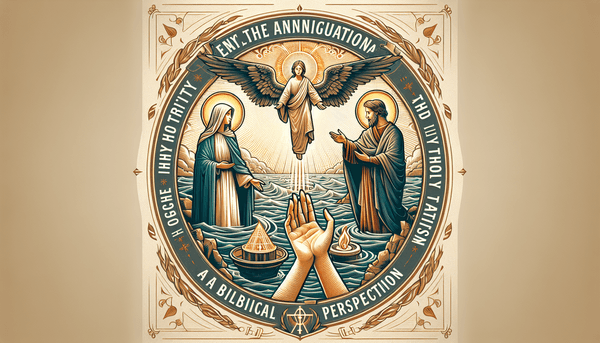The Annunciation to Mary
The Annunciation, as detailed in the Gospel of Luke, presents a divine message delivered by an angel to a young Mary, who is told that she will bear the Son of God. Mary's initial reaction is one of understandable perplexity as she questions, 'How will this be, since I am a virgin?' (Luke 1:34). Despite her initial surprise, Mary's acceptance of God's will is a testament to her faith, as she responds with, 'I am the Lord’s servant...May your word to me be fulfilled' (Luke 1:38). This encounter not only depicts Mary's crucial role in the divine plan but also serves as a model of submission and trust in God's providence. The virgin birth fulfills the prophecy found in Isaiah 7:14 and is further elaborated in Matthew 1:18-25, where Joseph learns of the miraculous conception, and in Luke 1:46-55, where Mary's Magnificat expresses her profound joy and humility before God.
Understanding the Holy Trinity
The Holy Trinity is a cornerstone of Christian theology, describing the mysterious coexistence of the Father, the Son, and the Holy Spirit as one God in three persons. Jesus' command to baptize 'in the name of the Father and of the Son and of the Holy Spirit' (Matthew 28:19) provides a foundational scriptural basis for this doctrine. The Trinity is integral to Christian worship, shaping our understanding of God's nature and guiding our approach to prayer and liturgy. It invites believers to engage with the triune God who reveals Himself through the divine Word (John 1:1-14), the grace and fellowship found in the community of believers (2 Corinthians 13:14), and the promise of the Holy Spirit as another Advocate (John 14:16-17). Scriptures such as 1 John 5:7 are often associated with the Trinity, despite textual and translational debates, and they contribute to the ongoing theological reflection on this profound mystery.
FAQ
Q: What did Mary say to the angel?
A: Mary said to the angel, \"How will this be, since I am a virgin?\" (Luke 1:34).
Q: Is God 1, or 3 in 1?
A: God is often referred to as the Holy Trinity, which consists of the Father, the Son (Jesus Christ), and the Holy Spirit. This concept is expressed in Matthew 28:19, where Jesus instructs his disciples to baptize in the name of the Father, the Son, and the Holy Spirit.
Q: Doesn’t Jesus say to be baptized in the name of Jesus Christ?
A: In the book of Acts, there are instances where people were baptized in the name of Jesus Christ. For example, Acts 2:38 mentions, \"Repent, and let every one of you be baptized in the name of Jesus Christ for the remission of sins; and you shall receive the gift of the Holy Spirit.\"
Q: What does Christ say about baptism in the Bible?
A: In Matthew 28:19-20, Jesus instructs His disciples, \"Go therefore and make disciples of all the nations, baptizing them in the name of the Father and of the Son and of the Holy Spirit.\"





